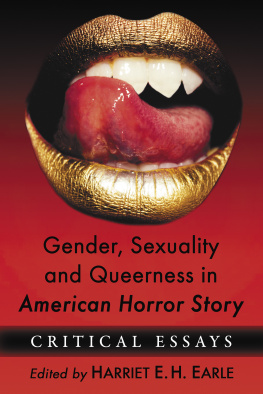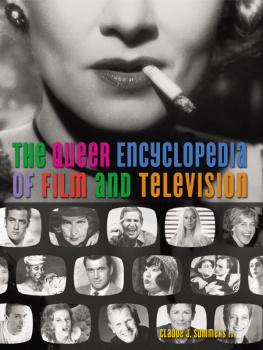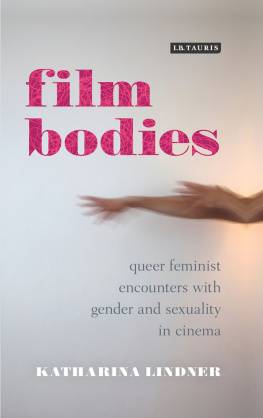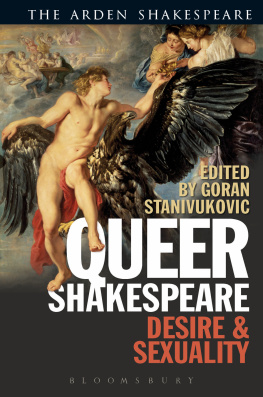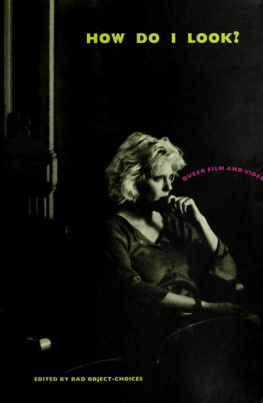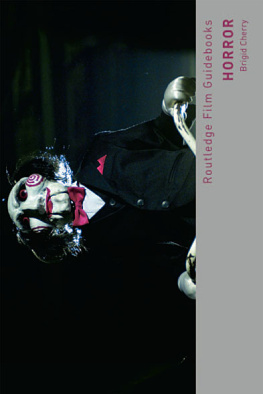Darren Elliott-Smith is Senior Lecturer in Film and Television at the University of Hertfordshire. His research focuses on queerness, gender and the body in horror film and television. He completed his PhD at Royal Holloway.
Darren Elliot-Smiths well researched volume takes horror cinemas long held interest in the sexual Other as its starting point, before fully exploring how the concept of queer horror has moved from subtext to centre stage in a range of mainstream and indie film and TV representations. By drawing on relevant film studies, queer theory and psychoanalytic methodologies, Queer Horror Film and Television remains a rigorous study of the changing status of sexuality in the genre. Equally, by drawing in a wide selection of case-studies from body horror classics such as Carrie and experimental film traditions, to more recent Gaysploitation slasher film parodies and cult TV hits such as American Horror Story, this volume will appeal to scholars, students and fans alike.
Xavier Mendik, Professor of Cult Cinema Studies, Birmingham City University
Queer readings of horror films have been around since the camp excesses of James Whales The Bride of Frankenstein but Elliot-Smith takes the study of Queer Horror in startling new directions, stepping beyond the metaphor and into a world where horror is overtly used as a creative means of questioning, expressing, and exploring queer sexuality in the twenty-first century. Rigorously researched and offering rich textual and cultural analysis of a diverse, and eye-opening, range of horror films and TV series, this book offers a transformative understanding of horror.
Stacey Abbott, Reader in Film and Television Studies, Roehampton University and author of Celluloid Vampires (2007) and Undead Apocalypse (forthcoming)
Library of Gender and Popular Culture
From Mad Men to gaming culture, performance art to steam-punk fashion, the presentation and representation of gender continues to saturate popular media. This new series seeks to explore the intersection of gender and popular culture engaging with a variety of texts drawn primarily from Art, fashion TV, Cinema, Cultural Studies and Media Studies as a way of considering various models for understanding the complimentary relationship between gender identities and popular culture. By considering race, ethnicity, class, and sexual identities across a range of cultural forms, each book in the series will adopt a critical stance towards issues surrounding the development of gender identities and popular and mass cultural products.
For further information or enquiries, please contact the library series editors:
Claire Nally: claire.nally@northumbria.ac.uk
Angela Smith: angela.smith@sunderland.ac.uk
Advisory Board:
Dr Kate Ames, Central Queensland University, Australia
Prof Leslie Heywood, Binghampton University, USA
Dr Michael Higgins, Strathclyde University, UK
Prof sa Kroon, rebro University, Sweden
Dr Niall Richardson, Sussex University, UK
Dr Jacki Willson, Central St Martins, University of Arts London, UK
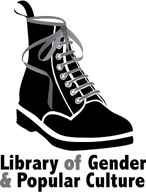
Published and forthcoming titles:
Ageing Femininity on Film: The Older Woman in Contemporary Cinema
Niall Richardson
All-American TV Crime Drama: Law and Order: Special Victims Unit, Gender and Citizenship
Lisa Cuklanz and Sujata Moorti
Beyonc, Feminism and Popular Culture
Kirsty Fairclough-Isaacs
Female Bodies and Performance in Film: Queer Encounters with Embodiment and Affect
Katharina Lindner
Framing the Single Mother: Gender, Politics and Family Values in Contemporary Popular Cinema
Louise Fitzgerald
Gay Pornography: Representations of Sexuality and Masculinity
John Mercer
Gender and Economics in Popular Culture: Femininity, Masculinity and Austerity in Film and TV
Helen Davies and Claire OCallaghan (Eds)
The Gendered Motorcycle: Representations in Society, Media and Popular Culture
Esperanza Miyake
Gendering History on Screen: Women Filmmakers and Historical Films
Julia Erhart
Girls Like This, Boys Like That: The Reproduction of Gender in Contemporary Youth Cultures
Victoria Cann
Love Wars: Television Romantic Comedy
Mary Irwin
Masculinity in Contemporary Science Fiction Cinema : Cyborgs, Troopers and Other Men of the Future
Marianne Kac-Vergne
Paradoxical Pleasures: Female Submission in Popular and Erotic Fiction
Anna Watz
Positive Images: Gay Men and HIV/AIDS in the Popular Culture of Post-Crisis
Dion Kagan
Queer Horror Film and Television: Sexuality and Masculinity at the Margins
Darren Elliott-Smith
Queer Sexualities in Early Film: Cinema and Male-Male Intimacy
Shane Brown
Shaping Gym Cultures: Body Image and Social Media
Nicholas Chare
Steampunk: Gender and the Neo-Victorian
Claire Nally
Television Comedy and Femininity: Queering Gender
Rosie White
Television, Technology and Gender: New Platforms and New Audiences
Sarah Arnold
Tweenhood: Femininity and Celebrity in Tween Popular Culture
Melanie Kennedy
Queer Horror
Film and
TELEVISION
Sexuality and Masculinity at the Margins
Darren Elliott-Smith

Published in 2016 by
I.B.Tauris & Co. Ltd
London New York
www.ibtauris.com
Copyright 2016 Darren Elliott-Smith
The right of Darren Elliott-Smith to be identified as the author of this work has been asserted by the author in accordance with the Copyright, Designs and Patents Act 1988.
All rights reserved. Except for brief quotations in a review, this book, or any part thereof, may not be reproduced, stored in or introduced into a retrieval system, or transmitted, in any form or by any means, electronic, mechanical, photocopying, recording or otherwise, without the prior written permission of the publisher.
Every attempt has been made to gain permission for the use of the images in this book. Any omissions will be rectified in future editions.
References to websites were correct at the time of writing.
Library of Gender and Popular Culture 11
ISBN: 978 1 78453 686 2
eISBN: 978 1 78672 137 2
ePDF: 978 1 78673 137 1
A full CIP record for this book is available from the British Library
A full CIP record is available from the Library of Congress
Library of Congress Catalog Card Number: available
Contents
A work of this length owes a debt of gratitude to many people. Firstly, thanks to Mandy Merck, for her support, her exemplary knowledge in the field, her support of my academic career, and for her ability to challenge me at every turn. I am also very indebted to those in my wider academic support network. These include Alison Peirse, Ruth ODonnell and Stacey Abbott, who all have offered much help, moral support, inspiration and good advice along the way.
Of vital importance to this study are those filmmakers and artists who have been kind enough to grant permission to reference their works and, in many cases, offer up their time in interviews to allow for invaluable insights into their creative thought-processes. These include Charles Lum, David Cerda, David DeCoteau, Bruce LaBruce, Jurgen Brning, Jason Paul Collum, Sean Abley, Paul Etheredge, Alan Rowe Kelly, Tony Vaguely, and Erik Jackson.
Next page

